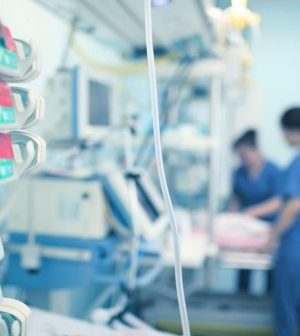- The Best Time of Day to Drink Bone Broth to Maximize Health Benefits
- 8 Ways to Increase Dopamine Naturally
- 7 Best Breads for Maintaining Stable Blood Sugar
- Gelatin vs. Collagen: Which is Best for Skin, Nails, and Joints?
- The Long-Term Effects of Daily Turmeric Supplements on Liver Health
- Could Your Grocery Store Meat Be Causing Recurring UTIs?
- Are You Making This Expensive Thermostat Error This Winter?
- Recognizing the Signs of Hypothyroidism
- 10 Strategies to Overcome Insomnia
- Could Artificial Sweeteners Be Aging the Brain Faster?
Most Vaccine-Hesitant Health Care Workers Change Their Minds, Study Shows

Most health care workers at a large U.S. hospital who initially refused COVID-19 vaccines eventually went and got their shots, new research reveals.
“This study found health care workers’ attitudes about COVID-19 vaccination could change in a very short period of time,” said lead study author Charlesnika Evans. She is a professor of preventive medicine in epidemiology at Northwestern University Feinberg School of Medicine in Chicago.
“It shows there is opportunity to change people’s decisions about not getting vaccinated,” Evans said in a university news release.
For the study, her team surveyed nearly 4,200 health care workers at Northwestern Medicine when COVID-19 vaccines became available last winter. At that time, three-quarters said they intended to take the shots. By spring, a second survey found that 95% had been vaccinated, including 90% of those who had been unsure.
Of those who initially said they didn’t plan to get vaccinated, nearly 60% had done so by spring, according to findings recently published in the journal Infection Control & Hospital Epidemiology.
The researchers said several factors likely helped change reluctant health care workers’ minds. They included clear messaging about vaccine safety; easy access to shots at the hospital; awareness that workplace mandates were on the way; and emergency use authorization (EUA) of vaccines by the U.S. Food and Drug Administration.
“We saw a significant change in the number of people who said they would get the vaccine after the EUA was issued,” Evans said. “People may have felt, ‘OK, this might be safe for me to take.'”
Among health care workers, nurses were less likely than doctors to say they intended to get vaccinated. Black people were less likely than Asians, and women (especially those of reproductive age) were less likely than men to say they planned to get the shots.
Workers older than 65 were more likely than their younger colleagues to get vaccinated, the findings showed.
Evans noted that while a “good portion” of Black participants in the study eventually got vaccinated, “mistrust in the health care system is a concern.”
“That’s a larger issue to be addressed within society in general that goes way beyond this study,” she added. “We must continue thinking about how to improve our messaging and addressing the issues around mistrust toward the health care system. This is imperative for COVID-19 and other conditions.”
For example, she said more must be done to include a wide range of groups of people in vaccine or research studies.
“The fact that they didn’t actively recruit pregnant women into the vaccine studies makes sense early on, but to prove and be sure it’s safe and effective, inclusion of these groups in trials is important,” Evans said.
So far, data from the U.S. Centers for Disease Control and Prevention show that pregnant women have not experienced more adverse events than the general population, she noted.
More information
There’s more on COVID-19 vaccines at the U.S. Centers for Disease Control and Prevention.
SOURCE: Northwestern University, news release, Feb. 1, 2022
Source: HealthDay
Copyright © 2026 HealthDay. All rights reserved.










